Key themes related to human capital
We have identified three key themes for our human capital initiatives, human resource development, improving employee satisfaction, and promoting expanding roles of female employees, in an aim to foster a corporate culture that continues to create new value.
Fostering a corporate culture that continues to create new value
Ideal employee
Talented employees who have wide-ranging knowledge, and who can respond flexibly and quickly to increasingly diverse operations and changes in the times
Ideal working environment
An attractive and rewarding working environment that draws out the strengths of each employee to the fullest
Human resource KPIs for improving corporate value
| KPI | Results for FY2025/3 | Efforts to reach the goal | |
|---|---|---|---|
| Human resources development |
Rate of participation in grade-levelspecific training
※
100% |
Rate of participation in grade-levelspecific training
※
92% |
|
| Improving employee satisfaction |
Employee satisfaction
4.5 or more |
Employee satisfaction
4.75 |
|
| Promoting expanding roles of female employees |
By March 31, 2027 Percentage of female managers 5% or morePercentage of female manager candidates 10% or moreChildcare leave utilization rate Male:60% or moreFemale:100%Number of days of paid leave taken 8days or more per year and 50% or more of the number of days granted per year |
Percentage of female managers 2.8%Percentage of female manager candidates 9.4%Childcare leave utilization rate Male:92.9%Female:100%Number of days of paid leave taken 13.1 days per yearUtilization rate 68% |
|
※Calculated by dividing the "number of participants" for training by grade in each period by the "number of persons eligible to participate" specified at the beginning of the period
Human resources development
Training system
ZENKOKU HOSHO's training system is broadly divided into four categories: by grade, by work, cultivation of nurturing corporate culture, and self-development.
(1) Grade-level-specific training
In order to improve the capabilities of our workforce as a whole, we provide employees with opportunities to develop their skills through the use of inhouse group training, as well as external educational institutions such as seminars and e-learning. In FY2025/3, the grade-level-specific training time per person amounted to 13.4 hours, while training expenses stood at 80,240 yen per person.
The type of person we want employees to become by attending grade-level-specific training

(2) Work-specific training
ZENKOKU HOSHO conducts training by theme in order to raise the level of operational knowledge and capabilities in our core operations of sales, screening, and credit management.
(3) Fostering a nurturing corporate culture
In education based on on-the-job training (OJT), we strive to foster a culture of developing human resources by repeating a cycle in which evaluators, mentors, and the persons being evaluated identify issues and set goals through face-to-face communication.
(4) Self-development
We support the acquisition of a wide range of knowledge and qualifications that are directly related to our operations, and we subsidize correspondence courses and examination fees for all employees regardless of employment status. We have also introduced e-learning for the purpose of learning financial knowledge, business skills, and trends.
Supporting the acquisition of licenses and certifications
We are committed to subsidizing the examination fees (certification acquisition fees) for all licenses and certifications pertaining to promotion criteria when the employee has passed. We have also developed a system to give awards to employees who have obtained certifications that are useful for their work.
Through these efforts, we promote the enhancement of employee skills and motivation while fostering awareness of corporate activities.
| Certified as | No. of persons (passed exams for) |
|---|---|
| Real estate transaction agent | 146 |
| Level 2 or above financial planner | 187 |
| Attorney | 3 |
| Certified public accountant | 1 |
| Tax accountant | 2 |
| Labor and social security attorney | 3 |
| Certified administrative procedures legal specialist | 13 |
※As of March 31, 2025 (full-time employees only)
Training structure
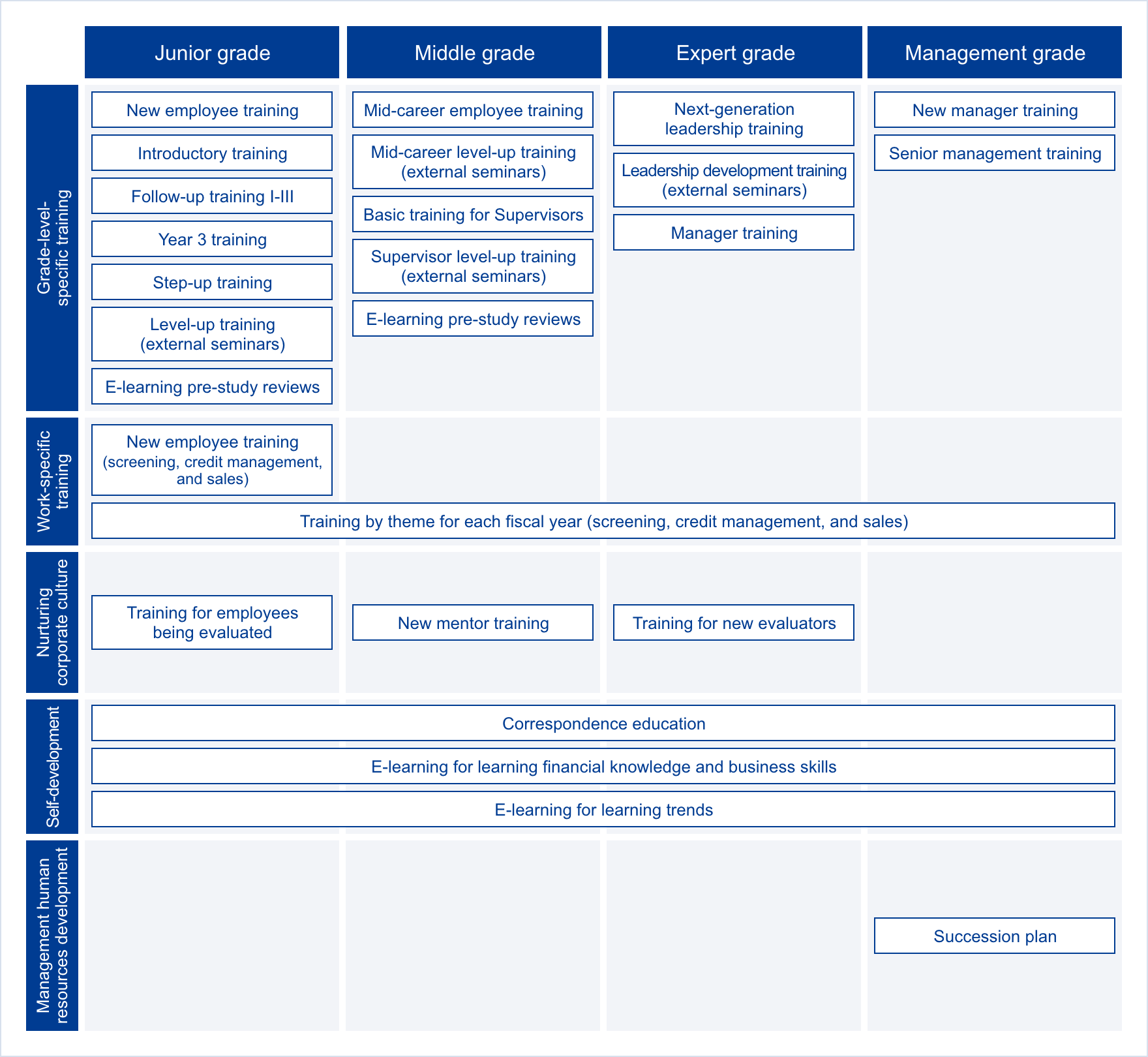
Evaluation system
At ZENKOKU HOSHO, each employee sets personal growth targets, reflecting areas in which they want to grow or should grow
over the next year, while reviewing their own work and performance level, based on company-wide and organizational goals.
Approaches to evaluation and perspectives of evaluation differ depending on the grade. The evaluation of junior and middle
grades emphasizes ability rather than actual performance, and the perspective of evaluation emphasizes behavior, attitude, and
mindset. Through our mentoring system, we clarify the gap between the employee's required level and their actual level, and
encourage the sustainable growth of our employees in order to achieve targets.
Actual performance is emphasized in addition to the above at the expert grade. From the management grade, actual performance
is an important consideration. In addition, a values evaluation that reflects the values and behavior expected of Directors as
articulated in the succession plan has been introduced beginning in FY2025/3.
| Junior grade Middle grade |
Expert grade | Management grade and above | |
|---|---|---|---|
| Approach | Emphasis on ability | Ability + actual performance | Actual performance + values |
| Evaluation perspective | Behavior, attitude, and mindset | Behavior, attitude, mindset, actual performance, and management | Actual performance, management, and values |
| Evaluation type | Ability evaluation | Ability evaluation | Actual performance evaluation |
| Self-growth target evaluation | Self-growth target evaluation | Management evaluation | |
| Actual performance evaluation | Values evaluation |
Succession plan
In relation to the types of persons required for the management of ZENKOKU HOSHO, we have determined that they must understand and practice the management philosophy of ZENKOKU HOSHO, possess the corporate culture (core values) of ZENKOKU HOSHO, and have a vision for the future (management strategy) of the ZENKOKU HOSHO Group. As part of the candidate selection process, we will focus on the development of candidates at the section manager level and above through a combination of "strategic placement and task execution (OJT)," "training (Off-JT)," and "assessments," thus narrowing down the final range of successor candidates. In order to ensure objectivity and transparency and prevent arbitrary decisions playing a role in the final selection process, we conduct the selection through meetings of the Evaluation and Development Meeting, and then verify the appropriateness of the decision at the management level at a meeting of the Nomination and Compensation Committee.
Creation of a talent pool through a succession plan
Selection process
We have established a selection process in which we ensure objectivity and transparency to prevent arbitrary decisions in the selection process.
| 1 Evaluation and Development Meeting |
|
|---|---|
| 2 Nomination and Compensation Committee |
|
| 3 Board of Directors |
|
Development plan
By forming a talent pool for each grade before developing human resources, we will narrow down the final range of successor candidates.
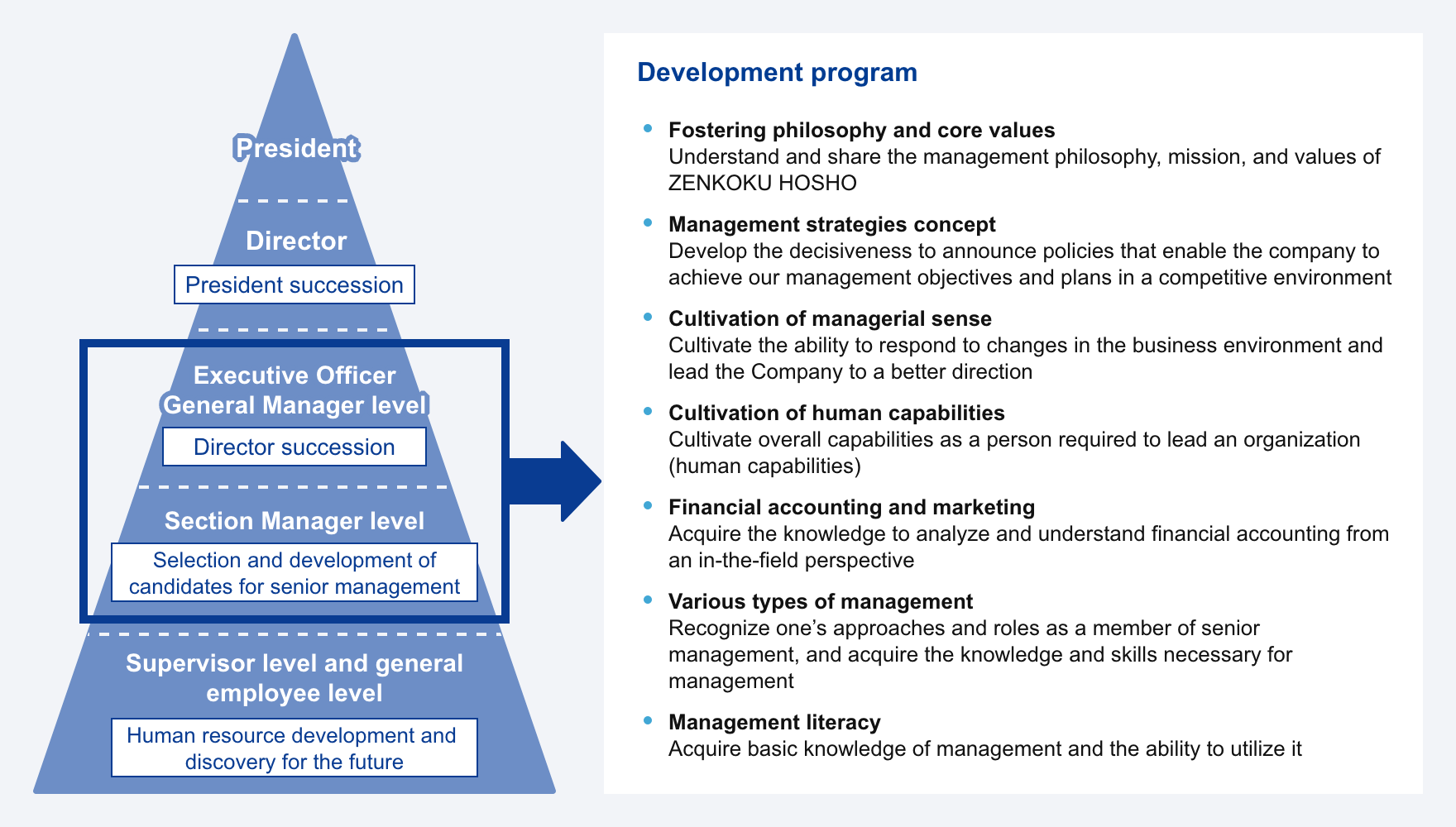
Improving employee satisfaction
At ZENKOKU HOSHO, we have conducted annual questionnaire surveys of our employees asking about such matters as their level of satisfaction with the workplace, Company, and job, work-life balance, and the promotion of women's participation and advancement from FY2024/3. We are working to further improve employee satisfaction and to create a rewarding workplace environment based on the results of the overall satisfaction in the employee awareness survey.
We have also conducted annual questionnaire surveys of our employees on such matters as their level of attachment to and enthusiasm for their workplace, Company, and job from FY2024/3. By conducting this engagement survey, we strive to understand their work engagement (to what degree employees are motivated in their work) and organizational commitment (to what degree employees consider corporate and organizational issues as their own concern).
Various measures were taken to address the priority issues identified through these two surveys.
Initiatives for FY2025/3
| Priority issues | Major initiatives | Results |
|---|---|---|
| Sense of satisfaction with evaluation |
|
◎ Improvement in many items
Consider further improvement initiatives for items that remain at low levels
|
| Division of work and working hours that take employee health into consideration |
|
◎ Improvement in many items
Continue efforts to increase scores
|
| Appropriate work division and compensation levels |
|
◎ Improvement in many items
Continue efforts to increase scores
|
| Appropriate growth opportunities |
|
◎ Improvement in many items
Continue efforts to increase scores
|
Issues to be addressed in FY2026/3
| Priority issues | Direction of policies |
|---|---|
| Sense of satisfaction with evaluation |
|
| Division of work and working hours that take employee health into consideration |
|
| Appropriate work division and compensation levels |
|
| Appropriate growth opportunities |
|
| Sense of contribution to the organization |
|
Results of employee awareness survey for FY2025/3
| Number of employees surveyed | Number of valid responses | Response rate |
|---|---|---|
| 346 | 333 | 96.2% |
*Survey respondents: full-time (including seconded employees), contract, part-time, and temporary employees
Employee satisfaction
The average overall satisfaction score* in the employee awareness survey conducted in FY2025/3 was 4.75 points, producing favorable results and exceeding the previous results (4.67 points in the 2023 survey) and median of 4 points.
The percentage of the dissatisfied group (particularly dissatisfied and somewhat dissatisfied) decreased, while the percentages of the neutral and satisfied groups increased, indicating a degree of improvement from the last survey.
*Average based on a full score of 7 points
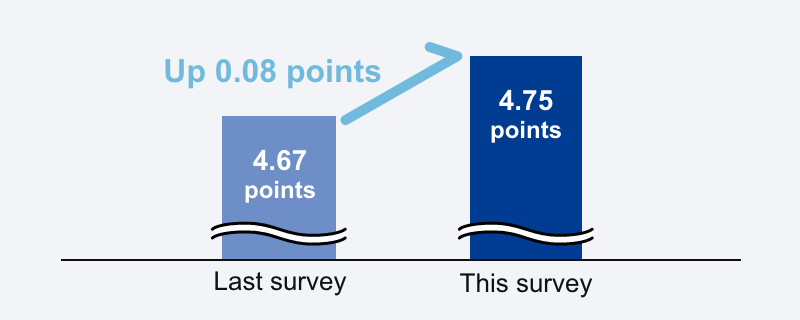
Trends in survey results
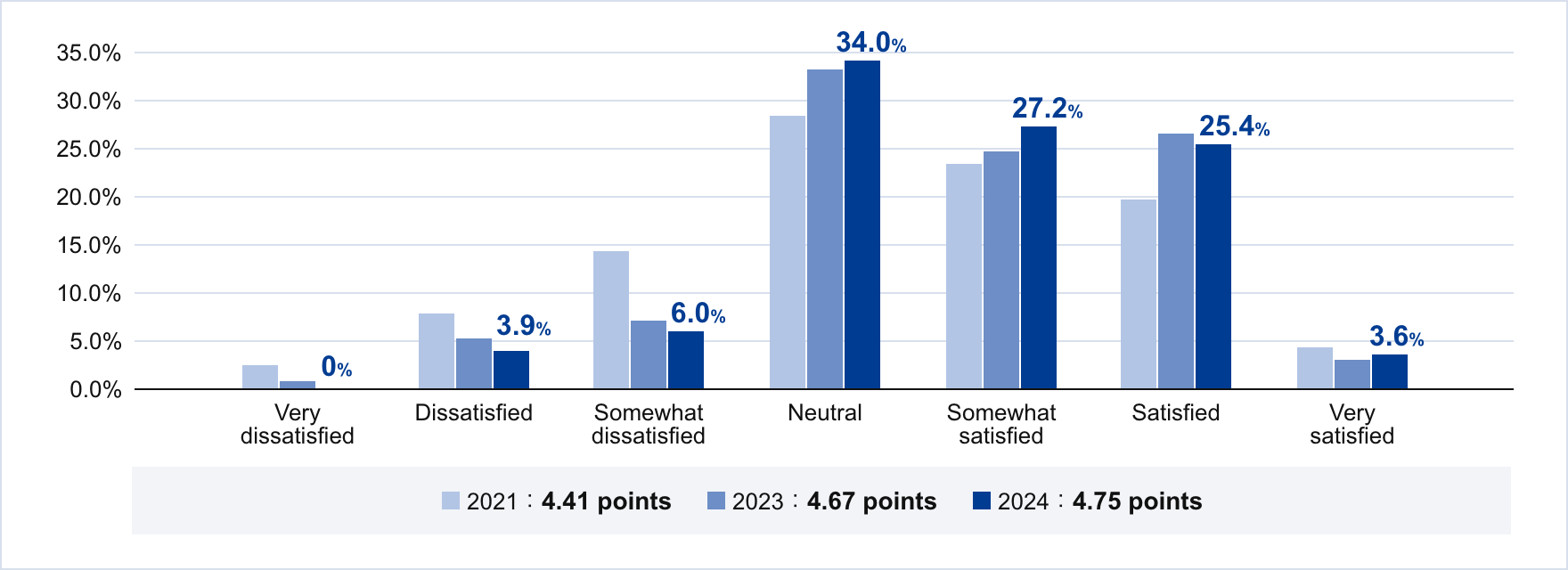
Engagement survey
Work engagement
The average score for work engagement*1, which represents job satisfaction, was 3.94 points, higher than the last survey's results (3.84 points in the 2023 survey). However, the score was lower than the median of 4 points.
*1Average based on a full score of 7 points
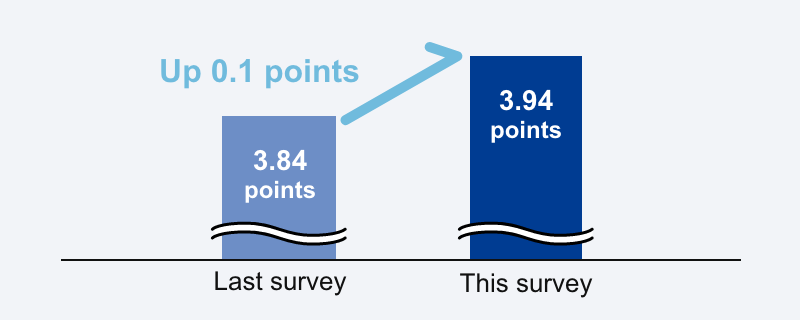
Organizational commitment
The average score for organizational commitment*2, which represents attachment to the organization, was 4.06 points, higher than the last survey's results (3.98 points in the 2023 survey). The score was also higher than the median of 3.5 points.
*2Average based on a full score of 6 points
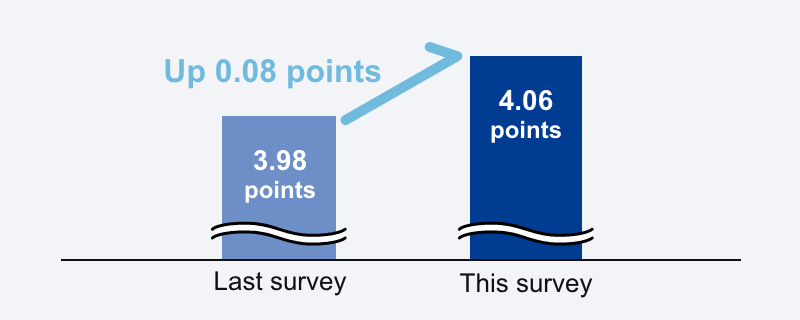
Engagement Structure
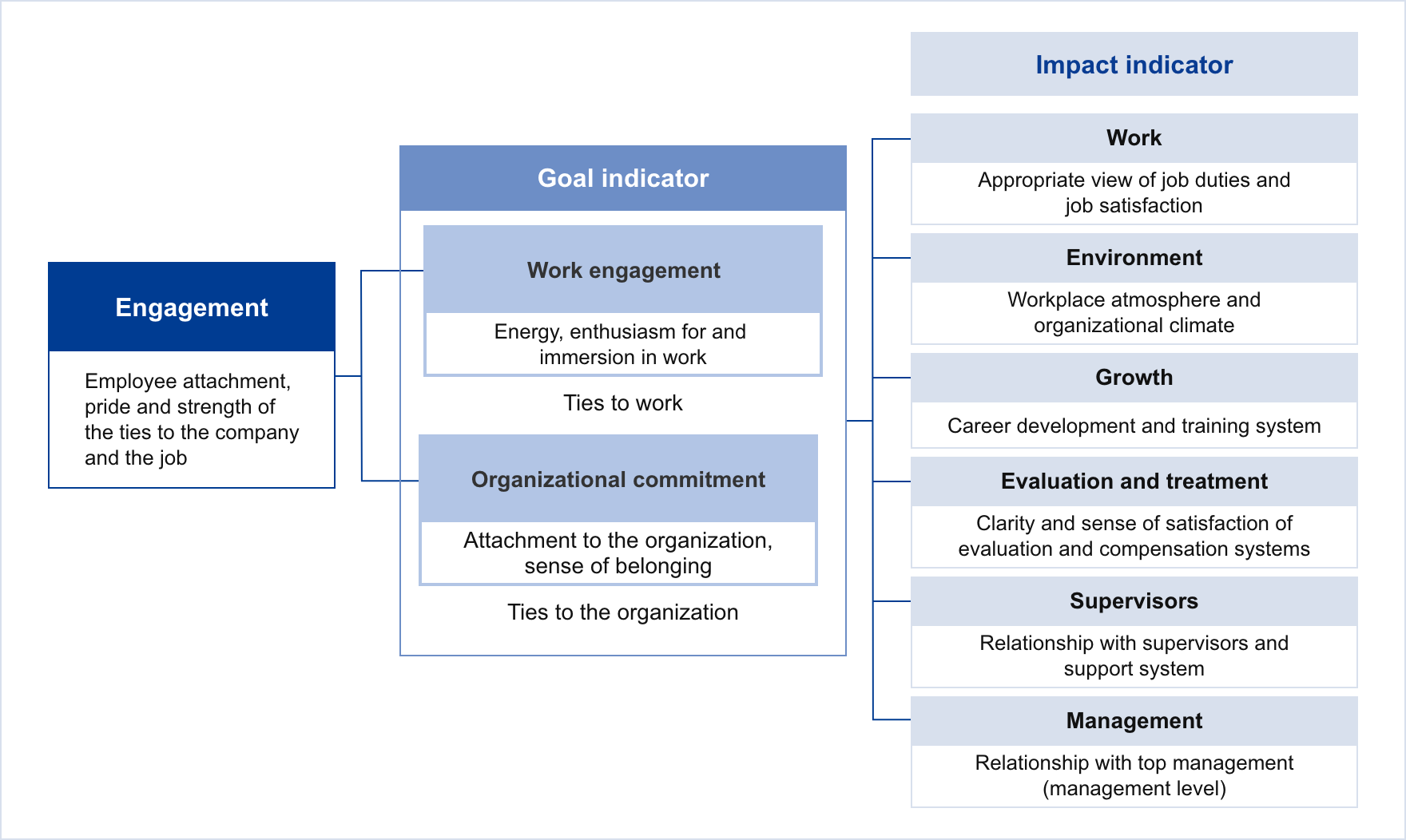
Creating a comfortable working environment
Believing that healthy work-life balance is the key to helping each employee realize their potential to the fullest, ZENKOKU HOSHO is striving to build a worker-friendly environment. Specifically, we are endeavoring to reduce working hours through such means as compliance with laws and regulations regarding working hours and minimum wages and utilizing an attendance management system to alert employees who accumulate too many overtime hours. In addition to providing various support schemes catered to the need of employees facing different life events--from child rearing, nursing care to self-development--we are also appealing to the mindset of the employees by creating workplace conditions that facilitate the use of these schemes and holding lectures to spread the understanding of the importance of work-life balance.
Employee benefits
Basic policies on various forms of harassment
The Group aims to help customers realize their dreams and happiness by offering the highest-quality instruments and services, and to contribute to the development of regional communities through its credit guarantee service business. In order to ensure that our officers and employees are able to commit fully to the realization of our management philosophy moving forward, we believe it is vital that we guarantee the provision of a working environment that allows them to work with security and peace of mind. To this end, we have formulated basic policies on various forms of harassment.
Initiatives to improve employee health
We are committed to improving employee health, based on the belief that maintaining and improving employee health will increase profitability and enhance our corporate value in the future.
Employee award programs
We give awards to employees who have obtained certifications that are useful for their work, employees who have served the Company for a long time, and offices/branches that performed excellently and contributed greatly to the Company, as a way to motivate employees and to raise their awareness of our corporate activities.
Promoting expanding roles of female employees
Three Target
ZENKOKU HOSHO promotes expanding the roles of female employees, and is working to create an environment where employees can easily take childbirth and childcare leaves, to ensure the same wages for the same work, reduce overtime working hours, provide training related to diversity, and support the work-life balance of employees so as to support employees in balancing their work and childcare and create a workplace environment where all employees feel comfortable working. The following are specific targets to be achieved by the end of March 2027.
Plan period
April 1, 2022 to March 31, 2027 (five years)
Target 1
- Increase the percentage of female managers to at least 5% by the end of the plan period.
- Increase the percentage of female manager candidates to at least 10% by the end of the plan period.
| Measures | |
|---|---|
| Develop the environment through personnel system revisions, etc. | |
| Take measures to expand job categories in which women can play active roles and raise career awareness of female employees | |
Target 2
- Increase the childcare leave acquisition rate to at least 60% for men and 100% for women by the end of the plan period.
| Measures | |
|---|---|
| Provide educational materials for employees who are pregnant or have given birth, employees whose spouses are pregnant or have given birth, and managers who have such employees under their supervision, and implement activities to promote the acquisition of leave, etc. | |
Target 3
- To have employees take at least eight days of paid leave per year and at least 50% of the total number of days of annual paid leave granted.
| Measures | |
|---|---|
| Check the implementation status, encourage employees to take leave, and provide support in that regard | |
Results for FY2025/3
| Percentage of female managers | 2.8% |
|---|---|
| Percentage of female manager candidates | 9.4% |
| Childcare leave utilization rate |
|
| Number of days of paid leave taken per year |
13.1 days per year Utilization rate: 68% |
